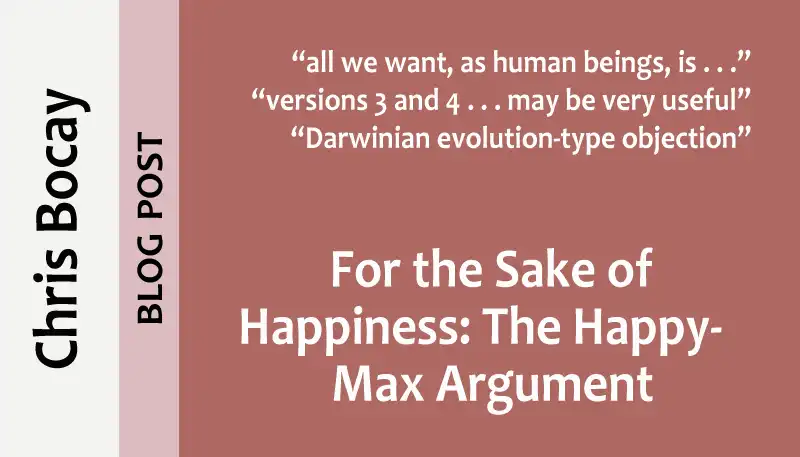
This article is about my Happy-Max argument, which promotes the idea that we must maximize our happiness in order to optimize our life.
KEYWORDS: Darwinian evolution, death, happiness, Happy-Max argument, joy, law of attraction, obstacles, philosophy, problems, psychology, survival of the fittest.
Here in this blog post I will present a philosophical argument for the maximization of our happiness and positivity.
I will in the following present a few different versions of it, to demonstrate how it can be used in “real life” in order to motivate ourselves, and others, into becoming more happy and positive about our life and our future.
Version 1
1. Our natural state of being is one of happiness and joy.
2. But death seems to stand in the way of happiness and joy.
3. Therefore, death must be ignored.
This argument may not be very easy to accept for many people (especially for those who are not law of attraction students). Although sentence 2 may be easy to accept, sentences 1 and 3 may sound unlikely.
In other words, this may seem like a really bad argument, at first. Sentence 1 might seem highly dubious to many people who are brought up in the Western world, who may think that life is all about competition and struggle and about the idea that “only the most fit will survive” and all of that.
And sentence 3, the conclusion, might seem just as wrong as sentence 1. For not only is sentence 3 not following from sentences 1 and 2 (since sentence 1 is perceived to be wrong, for many people), but it also sounds strongly “artificial” or “counter-intuitive”.
Nevertheless, for someone who is already on the way to become really good at using Law of Attraction deliberately, and who therefore already believes in sentence 1, the conclusion (sentence 3) is not at all “artificial” or “counter-intuitive”. For we, as law of attraction students, must always learn how to ignore various problems. And “death” is just one of those problems.
Now, even though a law of attraction follower might use this argument to remind himself (or herself) that he (or she) should not think negative things about death, let us try to find another argument that may be more attractive to those who are not yet law of attraction enthusiasts, who may need some more “soft” version of this.
Version 2
1. All we want, as human beings, is happiness and joy.
2. But death seems to stand in the way of happiness and joy.
3. Therefore, death must be ignored.
The only difference here in this second version is that sentence 1 is modified. Instead of talking about a “natural state of being” (as in version 1), I am here talking about our internal, subjective desire for happiness and joy.
And I think that this is easier to accept, for most people. That way, we do not get sidetracked into some Darwinian evolution-type objection about the “survival of the fittest” or anything like that, but are staying relatively objection-free in terms of sentence 1.
Nonetheless, the conclusion (sentence 3) in this version 2 might still be too hard to swallow, especially for a person who is not into the law of attraction. So we might need to play around with some other versions.
Version 3
1. All we want, as human beings, is happiness and joy.
2. But various problems always seem to stand in the way of happiness and joy.
3. Therefore, all these various problems must, somehow, be ignored.
Here I have modified sentences 2 and 3. And this change makes, I think, the argument easier to accept, for most people (whether or not they are law of attraction followers).
The basic idea here is that I have removed the word “death” and instead inserted the word “problem”. So the general principle, as seen in the conclusion (sentence 3), is that any problems must be ignored, for us to be able to focus on happiness and joy.
And this takes us, then, to the last version, in which we add another sentence.
Version 4
1. All we want, as human beings, is happiness and joy.
2a. But various problems always seem to stand in the way of happiness and joy.
2b. Problems may be small (a cold, a bad grade) or big (terminal disease).
3. Therefore, all these various problems must, somehow, be ignored.
So here in the last version we have added a new sentence to specify some examples of the idea of “problems”. So here then, in sentence 2b, we see that death, in the form of “terminal disease”, is “just” an example of a problem.
Suggested Usage
My idea here, then, is that a law of attraction follower might use any of these four arguments for his own purposes, to motivate himself to “carry on” in his search for more happiness and satisfaction.
My idea here, also, is to pave the way for better discussions with other people, who are not yet fully introduced to the idea of law of attraction. And in such cases, I think versions 3 and 4, presented in that order, may be very useful.
Also for such discussions, it may be helpful not to talk about version 1, for that may trigger too much negativity in terms of a potential “survival of the fittest” argument.
Regarding version 2, it may, or may not, be used in such discussions. But if it is, it seems best to save it until last, after versions 3 and 4 already have been presented.
One alternative, though, would be to use version 2 as a “teaser”, in order to raise interest for the discussion partner, after which one might introduce versions 3 and 4.
However, the success of this last approach depends heavily on the overall “attitude” of the discussion partner. So it’s definitely a “judgment call” for the presenter.
Chris Bocay



Leave a Reply